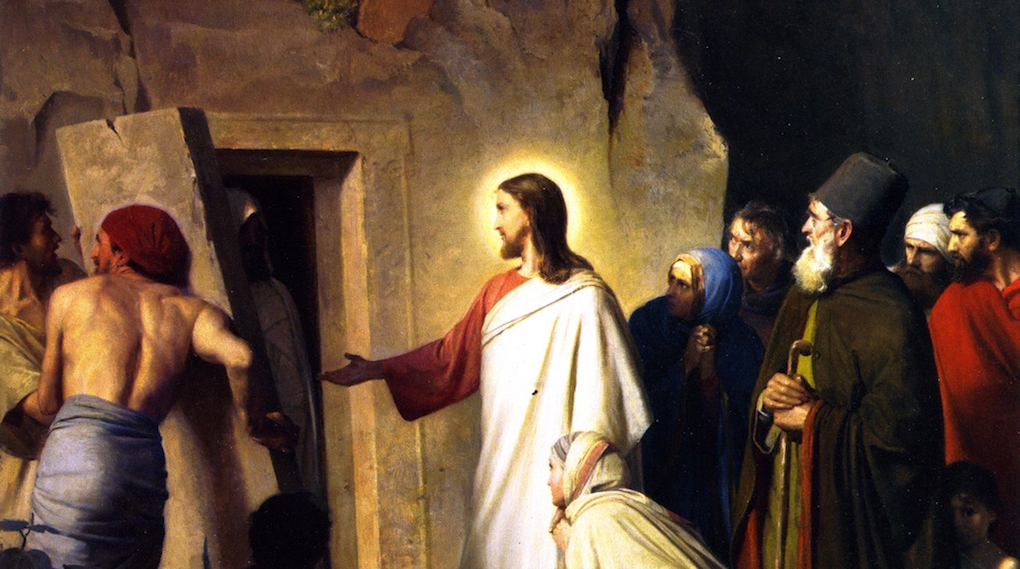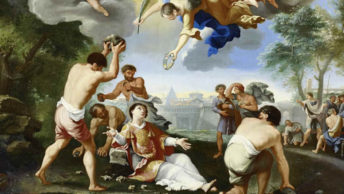Once again, let me remind all of us that the one being raised from the dead is not Lazarus any more (cf. John 11:1-45) but any one of us who might be tired of the cramped confinements of his or her “tomb.” Each day, God alone knows the exact number of those among us who are mentally, spiritually, morally, psychologically dead, or near death.
This is precisely the driving force from Ezekiel 37:12-14. Our loving God cannot bear the sight of our desolation, of our total dejection.
O my people, I will open your graves and have you rise from them…I will put my spirit in you that you may live…thus you shall know that I am the LORD. I have promised, and I will do it, says the LORD.
Some of us, hopefully very few, are dealing with something too big for them to handle; something that is eating them alive. Some of us, hopefully very few, spend sleepless nights on account of an impossible situation that is poisoning their existence. Some of us, hopefully very few, are quickly running out of hope. For them all, there is no need to describe their predicament; but for most there might be the need to find the cause of their sadness and paralysis.
At any rate, today, for all of us the relevant question is: “What is the one thing that is sapping, or might sap life out of me?” To help us deal with our situation in the way desired by our loving God, I would like to touch upon some relevant details of the story of Lazarus, which is now our story.
John 11:3 So the sisters sent word to him, saying, “Master, the one you love is ill.”
God has carved our name on the palm of His hand (cf. Isaiah 49:16). He doesn’t need any further identification. Each one of us is truly the one whom He loves!
John 11:6 So when Jesus heard that Lazarus was ill, he remained for two days in the place where he was.
Whenever we suffer, we look, we expect, we pray for an immediate solution. However, we have to learn to accept God’s timetable and to wait for it to unfold according to His divine plan.
John 11:21-22 Martha said to Jesus, “Lord, if you had been here, my brother would not have died.(But) even now I know that whatever you ask of God, God will give you.”
Many fall repeatedly in the trap of treating God as if He were a divine magician ready to fix any problem with a touch of His heavenly wand.
Again, we ought to keep in mind that God alone has the complete picture of our life before His eyes and, He alone knows how different events and situations are interconnected to the same desired, glorious end in His Kingdom.
John 11:25 I am the resurrection and the life, Jesus’ own identity, is not a postponement of physical death but a radical transformation of our life on earth to make it more and more similar to his earthly life and, therefore, opened to future, eternal glory.
John 11:33 When Jesus saw her weeping and the Jews who had come with her weeping, he became perturbed and deeply troubled,
John 11:35 And Jesus wept.
John 11:38 So Jesus, perturbed again, came to the tomb.
The love that our God has for us is not only thoroughly divine, not only very intense, not only capable of rousing His deepest emotions, not only aimed at possessing His whole self but, in Jesus, His Son, it is still in all similar to the way we, mere human beings, would feel in comparable situations, before the loss of those dearest to us.
No matter how thick our darkness, no matter how deep our dejection and grief, no matter how “lifeless” our life might be or become, it will never be beyond the care and closeness of our Lord.
John 11:41-42 And Jesus raised his eyes and said, “Father, I thank you for hearing me.I know that you always hear me; but because of the crowd here I have said this, that they may believe that you sent me.”
We now understand why all official and liturgical prayers of the Church end with the words: “through Christ our Lord.” Hence, all these prayers, without exception, never fail to reach the Father.
And also, we find in this narrative a reminder of why Jesus was sent among us; of why God became flesh: to lift us up from our prostration, from our defeats, from our “grave.”
John 11:43 And when Jesus had said this, he cried out in a loud voice, “Lazarus, come out!”
Doesn’t Jesus’ cry indicate how it is so humanly tempting to choose the quiet, the disengagement, the stillness of a grave over the bother of trying again, of getting up and risking another defeat, a deeper hurt?
This defeatist attitude of resignation and passivity, although wholly understandable nowadays with the dreadful specter of the coronavirus, it is wholly unbecoming of a true friend of Christ, and displeasing to our God, the God of life.
John 11:44 …So Jesus said to them, “Untie him and let him go.”
Interesting: according to God’s decree, the paralysis, the listlessness, the lethargy in which we might find ourselves requires the concerted effort of the whole community of faith.
Jesus wants all of us, here present, all members of our community of faith, to work together to untie each others’ burial bands so that all of us, barring none, may come out of our tombs and resume living more fully, more fruitfully, more joyfully in him who is the Way, the Truth and the Life.








